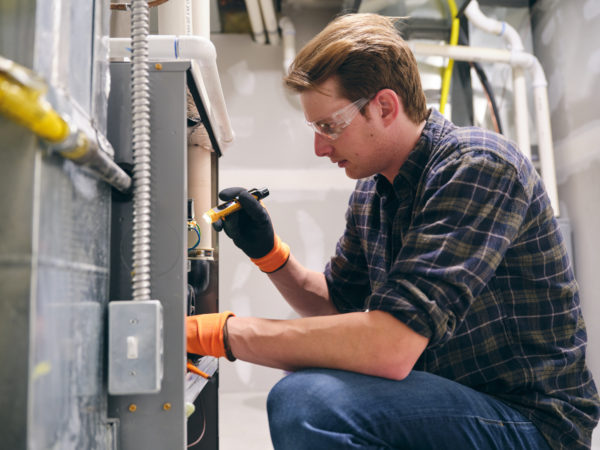9 Tips to Help You Conserve Heat This Winter

Keeping your home warm throughout the long, cold winter continues to get more and more costly. Thanks to rising energy prices, most people are looking for anything that may help to reduce their heating costs. To make this easier, here are some simple tips that can help you to conserve heat and save money on your energy bills this winter.
1. Schedule a Heating Tune-Up
The importance of regular HVAC maintenance cannot be overstated. If you don’t have your furnace maintained every year, your heating system simply won’t be as effective and will produce less heat. This means that your furnace will need to run longer to heat your home and that your energy bills will be much higher. A heating tune-up can prevent this by cleaning and inspecting your entire heating system to ensure it is functioning at full efficiency and effectiveness. In this way, your home will stay warmer, and your heating system won’t need to run as long.
2. Keep Vents Clear and Unobstructed
This is another one that won’t necessarily conserve heat, but it will ensure that your heating system is working effectively. Any furniture in front of or over your vents will block the airflow and cause that room to stay colder. As a result, your heating system will need to run for longer to fully warm the entire home.
Obstructed vents also lead to an increase in pressure inside the ductwork. This forces the blower fan to work much harder to circulate air throughout the building and will reduce the effectiveness of your heating system. In most cases, this issue will lead to any exterior rooms or those further away from the furnace constantly staying colder.
3. Close Off Unused Rooms
It is always recommended to keep the doors closed to any rooms that aren’t currently occupied. Closing the doors will trap the heat inside the room, and this can make it so that your furnace doesn’t need to run as often.
If you have some rooms or parts of the home that you rarely or never use, you can also close the vents in these rooms. This way you’re not wasting energy on heating areas that don’t really need it. However, you should never shut more than 25% of your vents. If too many vents are closed, it will create the same pressure and airflow issues as if the vents are obstructed.
4. Seal Up Air Leaks
This is one of the most important things you can do to conserve heat and keep your home warm. Air leaks in the attic will allow a huge amount of heat to escape and force your heating system to run much more often and for longer periods of time. Any leaks around your windows and doors are also a major issue and will allow a huge amount of cold air to get inside. The same is true if there are any cracks or gaps in your walls, foundation, crawl space, etc.
These problems are all related and have to do with the air pressure inside and outside the home. Air pressure always tries to remain balanced. Hot air leaking out of your attic will make it so that the air pressure inside the house is lower than the pressure outside. This results in cold air rushing into the building through any gaps or cracks so that the pressure is again balanced.
Leaks around the edges of windows and doors can be fixed by using caulk to create an airtight seal. You should also check that the weather stripping on all windows and doors is intact and seals properly to prevent leaks. Cracks and leaks in the basement or crawl space can usually be sealed with either caulk or spray foam insulation depending on how large they are.
If your home has a crawl space, you should also make sure to cover the vents so cold air can’t seep in. Most crawl spaces usually have at least a few air vents. The purpose of these vents is to prevent heat and humidity from building up inside the crawl space during the summer. During the winter, the vents serve no purpose and will make your home stay much colder if they are left open.
5. Check Your Level of Insulation
If your home isn’t sufficiently insulated, it will result in hot air escaping and cold air seeping in. Not enough insulation on the floor of your attic will allow most of the hot air to escape and force your furnace to run much more often. Similarly, insufficient insulation in your walls and basement or crawl space will allow cold air to penetrate inside. If you have trouble keeping your home warm during the winter, you should definitely hire a professional to check how much insulation your home has.
6. Use Plastic Window Film
Double- and triple-pane windows are great at insulating and keeping out the cold. The main reason has to do with the layer of air trapped between the panes, which acts as a barrier to keep the cold out. If your home has any single-pane windows, we highly recommend replacing them as this will have a huge effect on how warm your home stays and how much you spend on heating.
If you can’t replace your windows, you can use plastic window film to seal around them. The plastic will work to create an air barrier similar to a double-pane window. Although it won’t be nearly as efficient as replacing your windows, plastic window film can still go a long way toward keeping out the cold and helping you conserve heat.
7. Keep Your Chimney Flue Closed When Not in Use
Wood fireplaces are a great way to help stay warm during the winter. However, you should only ever open the chimney flue when the fireplace is lit. Whenever the fireplace is lit, the hot combustion fumes constantly rise up through the chimney. If the fireplace isn’t lit and the flue is open, the direction of airflow reverses. This means that cold air will get sucked inside and lower the temperature inside the home.
8. Limit the Use of Exhaust Fans
The exhaust fans in your kitchen and bathroom don’t just suck out steam and smoke when they are running. They will also draw out much of the heat in the room. Running your exhaust fan also reduces the air pressure and will cause cold air to flow into the building through any air gaps. For this reason, you should only ever use your exhaust fans in the winter when you absolutely have to.
9. Turn On Your Ceiling Fans
Running your ceiling fans during the winter will help to keep all of the hot air from collecting near your ceiling. This will make it so that the room stays warmer without needing to run the heating system. When using ceiling fans in the winter, make sure that they are spinning clockwise or in reverse. This will draw air upwards and force all of the hot air at the ceiling down into the room.
At Hoff Heating & AC, our professional heating maintenance and repair services can help ensure you stay warm this winter. We work on all makes and models of furnaces. We also install and service air conditioners, ductless mini-splits, and geothermal HVAC systems. Additionally, our team handles humidifiers, dehumidifiers, air filtration systems, air scrubbers, germicidal HVAC lights, and other indoor air quality equipment for customers. Call us today if you need any heating or cooling service in O’Fallon.

